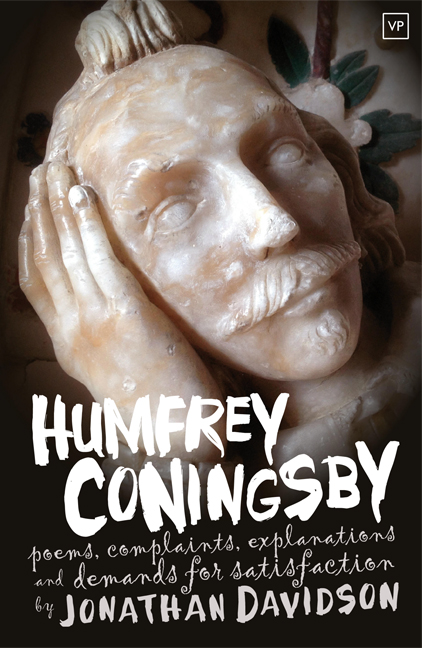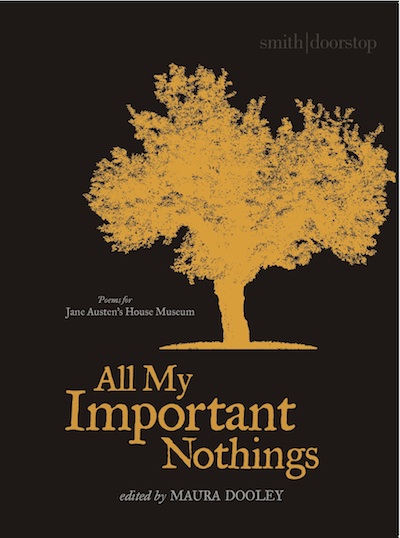Humfrey Coningsby by Jonathan Davidson
– Reviewed by JPL –
Among a plethora of worthy poetry publications, Jonathan Davidson’s Humfrey Coningsby – loosely based on the life of a sixteenth-century Shropshire lord – really does stand out. In the crucible of paradox, even hypocrisy, there is in the curmudgeon a curious independence of spirit, authenticity to the point of downright courage, and a touching if unexpected sensibility. While Humfrey Coningsby may be the swine who would borrow your horse and never return it, there are also qualities to admire in him. Jonathan Davidson explores such qualities, founded in Coningsby’s adventures, but does much else besides. He has ambition:
We always took him for a strange one.
We knew he wouldn’t die in his own bed,
But not either in anyone else’s.[‘A Neighbour’s Description’]
This is not merely returning a character from history to life, this is that radical stance that history is contemporaneous:
Locked in the intestinal streets of Aleppo,
I appraise beauty in a puddle of gasoline
And an abandoned sandal.Here I am alive, my Lords,
with your devices and decisions,
the creaking of rudimentary armour.[‘At Aleppo’]
His character is both then and now, and the ambition is that of a myth-maker, in the same way that Offa features in Geoffrey Hill’s ‘Mercian Hymns’, both alive and momentary, in and out of time.
Not since I left England have I been able
to get decent Wi-Fi or Bluetooth.
I consult timetables and alchemists,
I question servants and gods,
they give me philosophy and superstition.
They believe I may be man-handled
across this foaming stream,
or I may not; it is in the hands
of who knows who, they say, with a shrug
like soil sliding down a hillside.[‘Waiting for a Sign’]
Davidson’s tone reverberates with troubled insights –
They lay down their Kalashnikovs
and mortar bombs. I deposit on the same table
a kerchief of finest cambric or batiste.And so we fall to talking and it transpires
that all man’s misery is but fear and cant,
that we very much delight in fear and cant.[‘Talks about Talks’]
So many have disappeared; drowned,
starved, killed or carried off.
We estimate numbers, appeal for
sightings, map and track, tag
and locate, but they still fall
off the edge of the known world…….
the hangars and arrival halls of hell.
[‘We Have No Record’]
This conversational quality creates accessibility and direct impact, a necessity for myth creation. Within the conversational, a marked sense of humour allows the reader to smile through.
On my way home through Warwickshire,
the B17 giving sterling service,
but still sore. Pulled up
beneath the rocks. Leant the bike
against the sign. Comprehended
not a word of it and I speak six languages –
including on4e known only to myself
and the Sultan’s daughter –[Corley Rocks: No Fly Tipping By Order]
and he was left
looking through his years of life
at the heart and arteries of England
which pulsed slowly……..……….Where is
the native wisdom? All I see here
are cheery bumpkins and wild hops.
That’s not enough. I want sherbert.[Coningsby Returns to England, the Last Time]
History becomes contemporaneous: a burgeoning myth taken from a single life produces relevance to today (see Flying Business Class) and moral matters (see In Arcadia), nowhere better focused than in ‘Siege of Strigonium’, especially with its jibe at politicians or warmongers:
…..Don’t let the screaming
put you off your suppers, my Lords.
Part of me wished for the myth to be made of Gerard Winstanley, even Abiezer Coppe, Margaret Fell or Isaac Pennington from this period, but the down-to-earthness of tone is matched by crucial historical and contemporary realities that make this a relevant and resonant read.
There is also a life lived, and lived well in its own terms, a settling of affairs both material and emotional, which we must all be aware of as age or infirmity overtakes us. A resonance of Offa is felt in the final poem (‘Found Near The Body of Humfrey Coningsby’’) and the greatest compliment I am able to give this is that it stands on its own, neither overpowered by the Hillian ‘legacy’ nor in imitation of it. Perhaps more a poetic homage, then:
……..un-annotated,
slightly singed, smelling of new sweat.
Davidson’s tone is his own, and in bringing this myth/history to life, he awakens aspects of today vividly. I would not end with his ‘new sweat smells’, rather with “Where have I got to?”:
I think of my Captain from Bruges or Ghent;
no more of him. Her voice was secretive,
drew music from my bones. I will see her
again. Here or there. Now and again. Now,
this sleep envelops me. Sweet mint. Tea.[‘The Last Dream’]
Love too has got into this packed life, and here we have the value of what remains as well as being able to appreciate a poet with a nuanced ear, ambition of the highest order, and a thoroughly accomplished piece of work, augmented by excellent cover design and production. Buy it and you will know!




